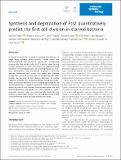Synthesis and degradation of FtsZ quantitatively predict the first cell division in starved bacteria
Author(s)
Sekar, Karthik; Rusconi, Roberto; Sauls, John T.; Fuhrer, Tobias; Noor, Elad; Nguyen, Jen; Fernandez, Vicente I.; Buffing, Marieke F.; Berney, Michael; Jun, Suckjoon; Stocker, Roman; Sauer, Uwe; ... Show more Show less
Download44320_2018_Article_BFMSB188623.pdf (8.375Mb)
Publisher with Creative Commons License
Publisher with Creative Commons License
Creative Commons Attribution
Terms of use
Metadata
Show full item recordAbstract
In natural environments, microbes are typically non‐dividing and gauge when nutrients permit division. Current models are phenomenological and specific to nutrient‐rich, exponentially growing cells, thus cannot predict the first division under limiting nutrient availability. To assess this regime, we supplied starving Escherichia coli with glucose pulses at increasing frequencies. Real‐time metabolomics and microfluidic single‐cell microscopy revealed unexpected, rapid protein, and nucleic acid synthesis already from minuscule glucose pulses in non‐dividing cells. Additionally, the lag time to first division shortened as pulsing frequency increased. We pinpointed division timing and dependence on nutrient frequency to the changing abundance of the division protein FtsZ. A dynamic, mechanistic model quantitatively relates lag time to FtsZ synthesis from nutrient pulses and FtsZ protease‐dependent degradation. Lag time changed in model‐congruent manners, when we experimentally modulated the synthesis or degradation of FtsZ. Thus, limiting abundance of FtsZ can quantitatively predict timing of the first cell division.
Date issued
2018-11-05Department
Massachusetts Institute of Technology. Microbiology Graduate ProgramJournal
Molecular Systems Biology
Publisher
Nature Publishing Group UK
Citation
Mol Syst Biol. (2018) 14: e8623
Version: Final published version